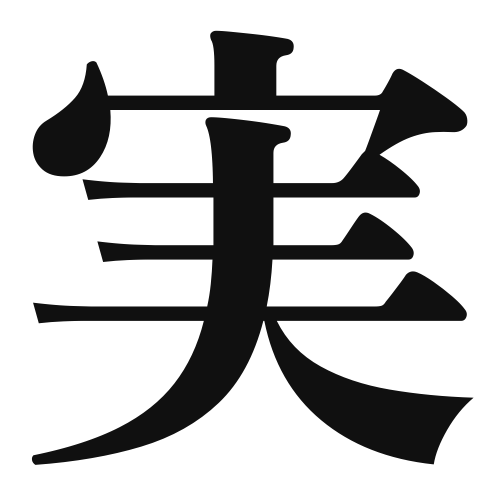1. Overview of Meaning
The kanji 実 (pronounced “mi” or “jitsu”) primarily means “fruit,” “truth,” or “reality.” It conveys the idea of something that is real, genuine, or tangible, often associated with the results or outcomes of actions.
2. Origin and Radical
Formation of the Kanji: The kanji 実 is a phono-semantic compound, which means it combines both a phonetic and a semantic component. The left part, 木 (tree), suggests a connection to nature, while the right part, 戈 (spear), adds a phonetic element.
Radical: The radical of 実 is 木, which relates to trees and plants, emphasizing its connection to the natural world and the idea of growth and fruition.
3. Examples of Usage
Common Words and Phrases: Some frequently used words that include 実 are:
- 実際 (jissai) – reality, actual
- 実験 (jikken) – experiment
- 実る (minoru) – to bear fruit, to ripen
Example Sentences in Daily Conversation:
- このプロジェクトは実際に成功しました。
(Kono purojekuto wa jissai ni seikou shimashita.) – This project was actually successful. - 彼は実験を行っています。
(Kare wa jikken o okonatteimasu.) – He is conducting an experiment.
4. Synonyms and Antonyms
Similar Kanji: A kanji with a similar meaning is 真 (shin), which means “true” or “real,” but it often emphasizes the concept of truth rather than the tangible aspect of reality.
Opposite Kanji: An antonym is 虚 (kyo), which means “false” or “empty,” representing the absence of reality or substance.
5. Cultural and Historical Background
Connection to Japanese Culture: The concept of 実 is deeply rooted in Japanese culture, where the idea of authenticity and the results of one’s efforts are highly valued. It reflects the importance of being genuine and achieving tangible results.
Proverbs and Idioms: One common saying is 実るほど頭を垂れる稲穂かな (minoru hodo kashira o tareru inaho kana), which translates to “The more a rice plant bears fruit, the more it bows its head,” emphasizing humility in success.
